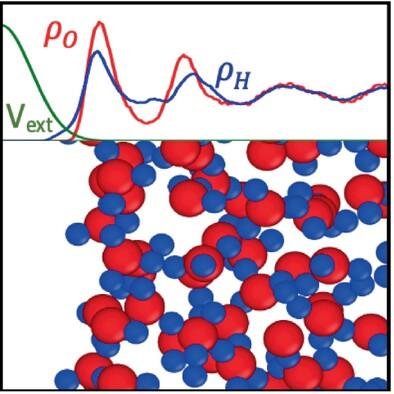当前位置:
X-MOL 学术
›
J. Comput. Chem.
›
论文详情
Our official English website, www.x-mol.net, welcomes your feedback! (Note: you will need to create a separate account there.)
Improving the reliability of machine learned potentials for modeling inhomogeneous liquids
Journal of Computational Chemistry ( IF 3 ) Pub Date : 2024-04-25 , DOI: 10.1002/jcc.27353 Kamron Fazel 1 , Nima Karimitari 2 , Tanooj Shah 1 , Christopher Sutton 2 , Ravishankar Sundararaman 1
Journal of Computational Chemistry ( IF 3 ) Pub Date : 2024-04-25 , DOI: 10.1002/jcc.27353 Kamron Fazel 1 , Nima Karimitari 2 , Tanooj Shah 1 , Christopher Sutton 2 , Ravishankar Sundararaman 1
Affiliation

|
The atomic‐scale response of inhomogeneous fluids at interfaces and surrounding solute particles plays a critical role in governing chemical, electrochemical, and biological processes. Classical molecular dynamics simulations have been applied extensively to simulate the response of fluids to inhomogeneities directly, but are limited by the accuracy of the underlying interatomic potentials. Here, we use neural network potentials (NNPs) trained to ab initio simulations to accurately predict the inhomogeneous responses of two distinct fluids: liquid water and molten NaCl. Although NNPs can be readily trained to model complex bulk systems across a range of state points, we show that to appropriately model a fluid's response at an interface, relevant inhomogeneous configurations must be included in the training data. In order to sufficiently sample appropriate configurations of such inhomogeneous fluids, we develop protocols based on molecular dynamics simulations in the presence of external potentials. We demonstrate that NNPs trained on inhomogeneous fluid configurations can more accurately predict several key properties of fluids—including the density response, surface tension and size‐dependent cavitation free energies—for liquid water and molten NaCl, compared to both empirical interatomic potentials and NNPs that are not trained on such inhomogeneous configurations. This work therefore provides a first demonstration and framework to extract the response of inhomogeneous fluids from first principles for classical density‐functional treatment of fluids free from empirical potentials.
中文翻译:

提高机器学习潜力的不均匀液体建模的可靠性
界面和周围溶质颗粒的不均匀流体的原子尺度响应在控制化学、电化学和生物过程中发挥着关键作用。经典分子动力学模拟已广泛应用于直接模拟流体对不均匀性的响应,但受到潜在原子间势的准确性的限制。在这里,我们使用经过从头模拟训练的神经网络势 (NNP) 来准确预测两种不同流体:液态水和熔融氯化钠的非均匀响应。虽然 NNP 可以很容易地被训练来模拟一系列状态点上的复杂体系统,但我们表明,为了正确地模拟界面处的流体响应,相关的非均匀配置必须包含在训练数据中。为了充分采样此类不均匀流体的适当配置,我们开发了基于存在外部电势的分子动力学模拟的协议。我们证明,与经验原子间势和 NNP 相比,经过非均匀流体构型训练的 NNP 可以更准确地预测液态水和熔融 NaCl 的流体的几个关键特性,包括密度响应、表面张力和尺寸相关的空化自由能。没有接受过这种不均匀配置的培训。因此,这项工作提供了第一个演示和框架,用于从不受经验势影响的流体的经典密度泛函处理的第一原理中提取非均匀流体的响应。
更新日期:2024-04-25
中文翻译:

提高机器学习潜力的不均匀液体建模的可靠性
界面和周围溶质颗粒的不均匀流体的原子尺度响应在控制化学、电化学和生物过程中发挥着关键作用。经典分子动力学模拟已广泛应用于直接模拟流体对不均匀性的响应,但受到潜在原子间势的准确性的限制。在这里,我们使用经过从头模拟训练的神经网络势 (NNP) 来准确预测两种不同流体:液态水和熔融氯化钠的非均匀响应。虽然 NNP 可以很容易地被训练来模拟一系列状态点上的复杂体系统,但我们表明,为了正确地模拟界面处的流体响应,相关的非均匀配置必须包含在训练数据中。为了充分采样此类不均匀流体的适当配置,我们开发了基于存在外部电势的分子动力学模拟的协议。我们证明,与经验原子间势和 NNP 相比,经过非均匀流体构型训练的 NNP 可以更准确地预测液态水和熔融 NaCl 的流体的几个关键特性,包括密度响应、表面张力和尺寸相关的空化自由能。没有接受过这种不均匀配置的培训。因此,这项工作提供了第一个演示和框架,用于从不受经验势影响的流体的经典密度泛函处理的第一原理中提取非均匀流体的响应。



























 京公网安备 11010802027423号
京公网安备 11010802027423号